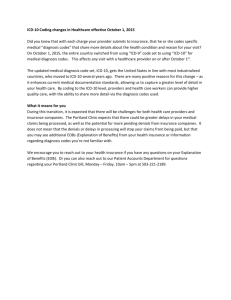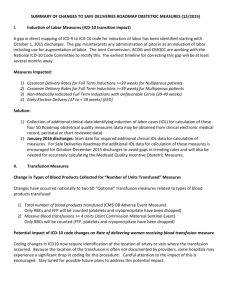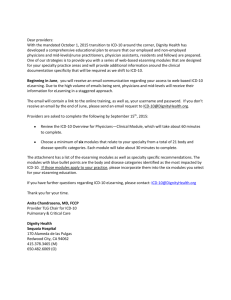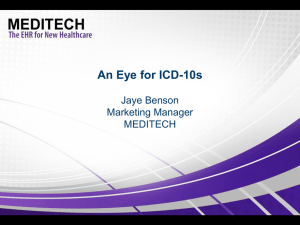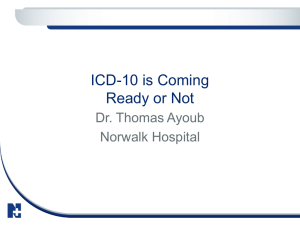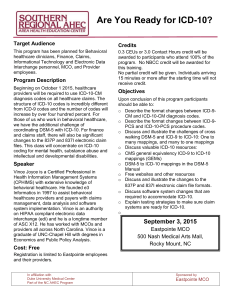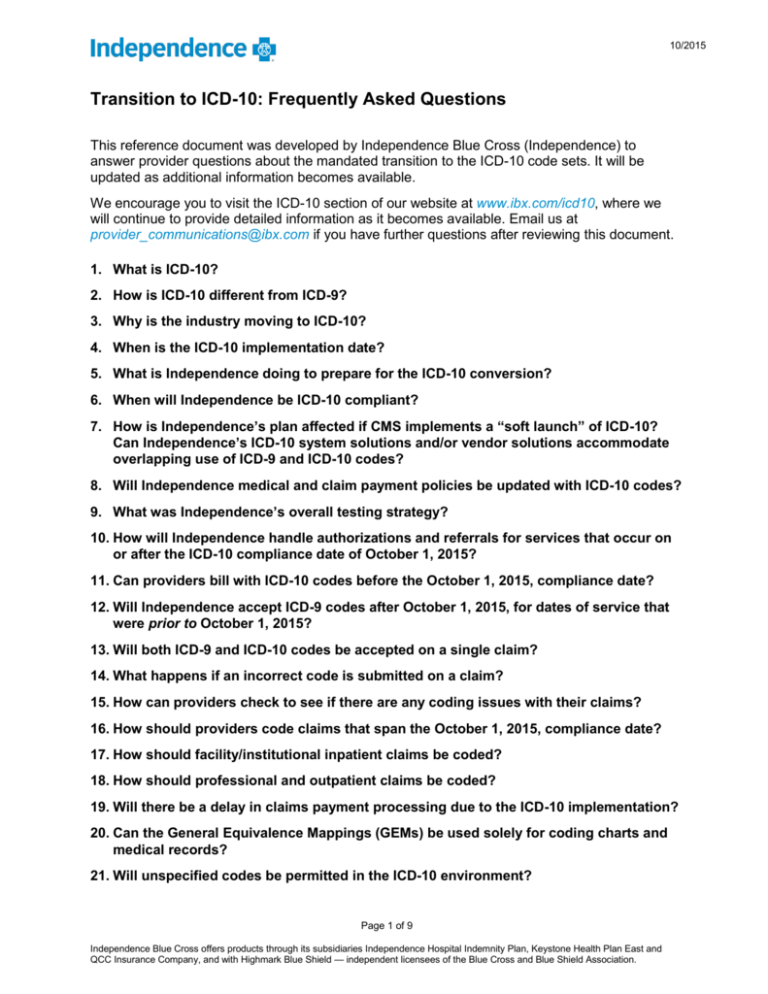
10/2015
Transition to ICD-10: Frequently Asked Questions
This reference document was developed by Independence Blue Cross (Independence) to
answer provider questions about the mandated transition to the ICD-10 code sets. It will be
updated as additional information becomes available.
We encourage you to visit the ICD-10 section of our website at www.ibx.com/icd10, where we
will continue to provide detailed information as it becomes available. Email us at
provider_communications@ibx.com if you have further questions after reviewing this document.
1. What is ICD-10?
2. How is ICD-10 different from ICD-9?
3. Why is the industry moving to ICD-10?
4. When is the ICD-10 implementation date?
5. What is Independence doing to prepare for the ICD-10 conversion?
6. When will Independence be ICD-10 compliant?
7. How is Independence’s plan affected if CMS implements a “soft launch” of ICD-10?
Can Independence’s ICD-10 system solutions and/or vendor solutions accommodate
overlapping use of ICD-9 and ICD-10 codes?
8. Will Independence medical and claim payment policies be updated with ICD-10 codes?
9. What was Independence’s overall testing strategy?
10. How will Independence handle authorizations and referrals for services that occur on
or after the ICD-10 compliance date of October 1, 2015?
11. Can providers bill with ICD-10 codes before the October 1, 2015, compliance date?
12. Will Independence accept ICD-9 codes after October 1, 2015, for dates of service that
were prior to October 1, 2015?
13. Will both ICD-9 and ICD-10 codes be accepted on a single claim?
14. What happens if an incorrect code is submitted on a claim?
15. How can providers check to see if there are any coding issues with their claims?
16. How should providers code claims that span the October 1, 2015, compliance date?
17. How should facility/institutional inpatient claims be coded?
18. How should professional and outpatient claims be coded?
19. Will there be a delay in claims payment processing due to the ICD-10 implementation?
20. Can the General Equivalence Mappings (GEMs) be used solely for coding charts and
medical records?
21. Will unspecified codes be permitted in the ICD-10 environment?
Page 1 of 9
Independence Blue Cross offers products through its subsidiaries Independence Hospital Indemnity Plan, Keystone Health Plan East and
QCC Insurance Company, and with Highmark Blue Shield — independent licensees of the Blue Cross and Blue Shield Association.
10/2015
Transition to ICD-10: Frequently Asked Questions
22. In July 2015, CMS announced that for the first 12 months Medicare will pay claims for
Medicare Fee-for-Service that are billed under the Part B physician fee schedule,
regardless of level of specificity, as long as the ICD-10 code is in the right family.
Independence requires claims to be coded to the greatest level of specificity available
for that encounter. What will happen in scenarios where Independence is the
secondary payer to Medicare?
23. How does the ICD-10 implementation affect providers that file paper claims?
24. Will Independence need to re-contract with network providers?
25. How should physician practices and facilities prepare for the transition to ICD-10?
26. How will Independence communicate with providers about the ICD-10 transition?
27. Where can I find additional information regarding ICD-10?
*******************************************************************
Page 2 of 9
Independence Blue Cross offers products through its subsidiaries Independence Hospital Indemnity Plan, Keystone Health Plan East and
QCC Insurance Company, and with Highmark Blue Shield — independent licensees of the Blue Cross and Blue Shield Association.
10/2015
Transition to ICD-10: Frequently Asked Questions
1. What is ICD-10?
ICD-10-CM is the United States’ clinical modification (CM) of the World Health Organization’s
(WHO) International Classification of Diseases (ICD) Tenth Revision. It is used to classify
diseases and causes of illness recorded on health records, claims, and other vital
information. ICD-10-PCS (Procedure Coding System) is the procedure classification system
that is used to report hospital inpatient procedures.
The U.S. Department of Health and Human Services (HHS) will require covered entities
(i.e., health plans, health care providers, and health care clearinghouses) that conduct
electronic HIPAA standard transactions to move from ICD-9 to the next generation ICD-10
code set on October 1, 2015.
Please be aware that Current Procedural Terminology (CPT®) and Healthcare Common
Procedure Coding System (HCPCS) codes will continue to be used for outpatient,
ambulatory, and office-based procedure coding.
2. How is ICD-10 different from ICD-9?
Generally, ICD-10-CM and ICD-10-PCS allow for a higher level of specificity over the ICD-9
code set.
ICD-9-CM versus ICD-10-CM:
ICD-9-CM and ICD-10-CM have the same hierarchical structure; however, there are
changes in the organization of the code set.
ICD-10-CM allows for more characters (from three to seven) and requires a
decimal point.
ICD-10-CM codes are alphanumeric, which adds laterality and provides a greater
level of specificity.
ICD-10-PCS:
The ICD-10-PCS has been completely revised.
ICD-10-PCS codes are always seven characters, and decimal points are not used.
ICD-10-PCS codes are alphanumeric.
ICD-10-PCS codes are constructed through the assignment of characters, each
representing an aspect of the inpatient procedure.
3. Why is the industry moving to ICD-10?
The implementation of ICD-10 will result in more accurate coding, which will improve the
ability to measure health care services, enhance the ability to monitor public health, improve
data reporting, and reduce the need for supporting documentation when submitting claims.
Return to questions
Page 3 of 9
Independence Blue Cross offers products through its subsidiaries Independence Hospital Indemnity Plan, Keystone Health Plan East and
QCC Insurance Company, and with Highmark Blue Shield — independent licensees of the Blue Cross and Blue Shield Association.
10/2015
Transition to ICD-10: Frequently Asked Questions
4. When is the ICD-10 implementation date?
The ICD-10 implementation date is October 1, 2015. Health plans, health care providers,
and health care clearinghouses that conduct standard health care transactions must use
ICD-10-CM diagnosis codes for services occurring on or after October 1, 2015, and
ICD-10-PCS codes for discharges occurring on or after October 1, 2015.
Background: HHS announced in January 2009 that ICD-10-CM and ICD-10-PCS must be
implemented into the HIPAA-mandated code set by October 1, 2013. Then, in April 2012,
HHS delayed ICD-10 implementation for one year. Again in 2014, ICD-10 was delayed for
one more year to its current implementation date of October 1, 2015.
5. What is Independence doing to prepare for the ICD-10 conversion?
Independence has a dedicated team working on the ICD-10 transition requirements. This
team has worked with each Independence business area to identify the impacts the ICD-10
transition has on the organization. A roadmap has been developed to define Independence’s
implementation plan, including a timeline to complete business requirements, system design
and development, internal and external testing, medical policy updates, communication
initiatives, and training.
We will work with the health care industry to build awareness and share information on
Independence’s plans for achieving full ICD-10 compliance by October 1, 2015. In addition,
we continue to work closely with the provider community to understand the impact of these
changes on physician offices and facilities as they work with vendors (e.g., software systems
and clearinghouses) to become ICD-10 compliant.
Independence continues to align its ICD-10 program milestones with the Centers for
Medicare & Medicaid Services (CMS) recommended timeline for ICD-10 readiness.
6. When will Independence be ICD-10 compliant?
Independence will be compliant by the mandated implementation date of October 1, 2015.
7. How is Independence’s plan affected if CMS implements a “soft launch” of ICD-10?
Can Independence’s ICD-10 system solutions and/or vendor solutions accommodate
overlapping use of ICD-9 and ICD-10 codes?
Independence’s plan will remain aligned with CMS effective dates. If CMS decides to
implement a “soft launch”, Independence would be able to support it, as Independence can
accommodate overlapping use of ICD-9 and ICD-10 codes. We have queried our vendors to
ascertain their technical and business capabilities of dual-processing, and there are no
exceptions to date.
Return to questions
Page 4 of 9
Independence Blue Cross offers products through its subsidiaries Independence Hospital Indemnity Plan, Keystone Health Plan East and
QCC Insurance Company, and with Highmark Blue Shield — independent licensees of the Blue Cross and Blue Shield Association.
10/2015
Transition to ICD-10: Frequently Asked Questions
8. Will Independence medical and claim payment policies be updated with ICD-10 codes?
In 2013, Independence began adding ICD-10 procedure and diagnosis codes to medical and
claim payment policies. As new policies are written and existing policies are reviewed and
updated, certified medical coders assess each policy and add ICD-10 codes. While the
ICD-10 codes are not in effect until October 1, 2015, providers can see how ICD-10 codes
will appear in our policies and how they differ from the ICD-9 codes. Medical and claim
payment policies are available at www.ibx.com/medpolicy.
For detailed instructions on how to view ICD-10 codes in our policies, please refer to
the ICD-10 codes now available in medical and claim payment policies article that ran in the
April 2013 edition of Partners in Health UpdateSM.
9. What was Independence’s overall testing strategy?
A dedicated ICD-10 testing team defined a testing strategy and identified scenarios for
internal functional, user-acceptance, end-to-end, and neutrality testing prior to coordinating
external testing.
Testing occurred throughout the first half of 2015, which allowed us to be ready for the
October 1, 2015, compliance date. Because we could not test with all providers, we continue
to communicate ICD-10 testing experiences in Partners in Health Update.
10. How will Independence handle authorizations and referrals for services that occur on
or after the ICD-10 compliance date of October 1, 2015?
Changes were recently made to the way authorizations and referrals are processed in
regards to ICD-9/ICD-10 coding, as reflected in the recent enhancements to the NaviNet®
web portal.
Please use the updated guidelines below when submitting an authorization and/or referral for
services that occur on or around the October 1, 2015, ICD-10 compliance date:
All authorization and referral requests submitted with an anticipated/proposed date of
service prior to and including September 30, 2015, are required to use ICD-9 codes.
All authorization and referral requests submitted with an anticipated/proposed date of
service on or after October 1, 2015, are required to use ICD-10 codes.
Important: If you already have an authorization or referral that was submitted with an
ICD-9 code and the actual date of service is on or after October 1, 2015, you do not need to
resubmit a new request. Independence will take steps to ensure claims processing is not
impacted.
If you already have an authorization that was submitted with an ICD-9 code with a beginning
date of service on or before to September 30, 2015, and you need to request an extension
(e.g., additional services or additional days) for dates of service on or after October 1, 2015,
you do not need to update the diagnosis code to ICD-10.
Note: When submitting an authorization request through NaviNet, please do not include the
decimal point when entering diagnosis codes. Use the ICD-9 code (for dates of service prior
to October 1, 2015) or ICD-10 code (for dates of service on or after October 1, 2015).
Page 5 of 9
Return to questions
Independence Blue Cross offers products through its subsidiaries Independence Hospital Indemnity Plan, Keystone Health Plan East and
QCC Insurance Company, and with Highmark Blue Shield — independent licensees of the Blue Cross and Blue Shield Association.
10/2015
Transition to ICD-10: Frequently Asked Questions
11. Can providers bill with ICD-10 codes before the October 1, 2015, compliance date?
No, providers should not bill with ICD-10 codes before the October 1, 2015, compliance date.
Claims using ICD-10 codes prior to October 1, 2015, will be rejected.
12. Will Independence accept ICD-9 codes after October 1, 2015, for dates of service that
were prior to October 1, 2015?
Yes, ICD-9 codes should be submitted on claims with dates of service prior to
October 1, 2015. Current regulations require the use of ICD-9 codes for dates of service prior
to the mandated implementation date. Inpatient claims with discharge dates on or after the
mandated implementation date must be coded in ICD-10. All outpatient and professional
claims with dates of service on or after the mandated implementation date must contain
ICD-10 diagnosis codes.
13. Will both ICD-9 and ICD-10 codes be accepted on a single claim?
No, in accordance with CMS billing guidelines, ICD-9 and ICD-10 codes cannot be submitted
as part of a single claim.
14. What happens if an incorrect code is submitted on a claim?
If your office submits an incorrect code on a claim (i.e., an ICD-9 code is submitted for a date
of service on or after October 1, 2015), your claim will be denied and sent back to you for
compliant coding. Depending on your clearinghouse, these invalid claims may either be
rejected directly by your clearinghouse or, if passed by the clearinghouse, may be rejected by
Independence.
15. How can providers check to see if there are any coding issues with their claims?
Providers should closely monitor any front-end reports from their clearinghouses and their
Health Care Claim Acknowledgement (277CA) transactions, Provider Explanation of
Benefits, and/or Provider Remittance from Independence to quickly identify and address
coding issues.
16. How should providers code claims that span the October 1, 2015, compliance date?
Depending on the type of claim (e.g., facility type, service), there are different rules for
how to code claims that span the ICD-10 compliance date. Please refer to MLN Matters®
Number: MM7492, a news flash published by CMS with detailed information based on facility
type/service. This document is available at www.cms.gov/Outreach-and-Education/MedicareLearning-Network-MLN/MLNMattersArticles/Downloads/SE1408.pdf.
Page 6 of 9
Return to questions
Independence Blue Cross offers products through its subsidiaries Independence Hospital Indemnity Plan, Keystone Health Plan East and
QCC Insurance Company, and with Highmark Blue Shield — independent licensees of the Blue Cross and Blue Shield Association.
10/2015
Transition to ICD-10: Frequently Asked Questions
Please note the following scenarios:
Overnight – single item services. If the time frame for the single item service
(e.g., Emergency Room, Observation) extends past midnight on September 30, 2015,
you should bill based on the line item date of service, as follows:
– For Emergency Room encounters, the line item date of service is the date the patient
enters the Emergency room.
–
For Observation encounters, the line item date of service is the date the observation
care began.
Durable medical equipment (DME). If the “From” date is on or before
September 30, 2015, you should bill using ICD-9 codes. If the “From” date is on or
after October 1, 2015, you should bill using ICD-10 codes.
ICD-10 Quick Tips
Claim type
Service date
Code set to use
for billing
Specialty/Outpatient
Date of service: On or before September 30, 2015
ICD-9
Specialty/Outpatient
Date of service: On or after October 1, 2015
ICD-10
Inpatient
Date of discharge: On or before September 30, 2015
ICD-9
Inpatient
Date of discharge: On or after October 1, 2015
ICD-10
Durable medical equipment
From date: On or before September 30, 2015
ICD-9
Durable medical equipment
From date: On or after October 1, 2015
ICD-10
17. How should facility/institutional inpatient claims be coded?
Facility/Institutional inpatient claims with a date of discharge on or before
September 30, 2015, must be billed with ICD-9 codes. Facility/Institutional inpatient claims
with a date of discharge on or after October 1, 2015, must be billed with ICD-10 codes.
We will not accept claims containing both ICD-9 and ICD-10 codes – as is consistent with
CMS billing guidelines.
18. How should professional and outpatient claims be coded?
Professional and outpatient claims with a date of service on or before September 30, 2015,
must be billed with ICD-9 codes. Professional and outpatient claims with a date of service on
or after October 1, 2015, must be billed with ICD-10 codes. We will not accept claims
containing both ICD-9 and ICD-10 codes – as is consistent with CMS billing guidelines.
19. Will there be a delay in claims payment processing due to the ICD-10 implementation?
There are no expected delays to claims payment. Providers should work with their trading
partners, clearinghouses, and billing vendors/billing software companies to ensure ICD-10
compliance and avoid claims rejections, processing delays, and revenue impacts.
Due to ICD-10, providers should closely monitor their rejected and accepted claims reports to
avoid processing delays, rejections, etc.
Page 7 of 9
Return to questions
Independence Blue Cross offers products through its subsidiaries Independence Hospital Indemnity Plan, Keystone Health Plan East and
QCC Insurance Company, and with Highmark Blue Shield — independent licensees of the Blue Cross and Blue Shield Association.
10/2015
Transition to ICD-10: Frequently Asked Questions
20. Can the General Equivalence Mappings (GEMs) be used solely for coding charts and
medical records?
No. GEMs should be used as a starting point to convert large databases and large code lists
from ICD-9 to ICD-10 or backward from ICD-10 to ICD-9. When coding charts, medical
records, and so forth, the coder should continue to use the ICD-10 coding books and coding
software to produce the most accurate code selection.
21. Will unspecified codes be permitted in the ICD-10 environment?
In both ICD-9-CM and ICD-10-CM, sign/symptom and unspecified codes have acceptable,
even necessary uses. While you should report specific diagnosis codes when they are
supported by the available medical record documentation and clinical knowledge of the
patient’s health condition, in some instances sign/symptom or unspecified codes are the best
choice to accurately reflect the health care encounter. You should code each health care
encounter to the level of specificity known for that encounter.
For example: L89.139 Pressure ulcer of right lower back – unspecified stage.
22. In July 2015, CMS announced that for the first 12 months Medicare will pay claims for
Medicare Fee-for-Service that are billed under the Part B physician fee schedule,
regardless of level of specificity, as long as the ICD-10 code is in the right family.
Independence requires claims to be coded to the greatest level of specificity available
for that encounter. What will happen in scenarios where Independence is the
secondary payer to Medicare?
In situations where Medicare pays the primary portion of the claim, as per the CMS Guidance
for leniency, and Independence is the secondary payer to Medicare, then Independence will
pay the secondary portion of the claim.
However, if Independence is the primary payer on the claim, then the claim will need to be
coded to the appropriate level of specificity known for that health care encounter to ensure
successful processing.
23. How does the ICD-10 implementation affect providers that file paper claims?
The ICD-10 code set must be used on all claims with a date of service or date of discharge
(for facility inpatient claims) on or after October 1, 2015. The method used to submit the claim
(i.e., paper or electronic) has no impact on the code set that should be used on the claim.
Please note that providers are required to use the current version of the 1500 Health
Insurance Claim Form (CMS-1500 [02/12]), which went into effect in 2014. Independence will
not accept claims using the old (08/05) claim form. For more information about the updated
CMS-1500 (02/12), please refer to the Key changes to CMS-1500 claim form and updated
toolkit now available article that ran in the March 2014 edition of Partners in Health Update.
24. Will Independence need to re-contract with network providers?
No, Independence will not need to re-contract with network providers, as current contract
language is sufficiently inclusive to cover ICD-10.
Page 8 of 9
Return to questions
Independence Blue Cross offers products through its subsidiaries Independence Hospital Indemnity Plan, Keystone Health Plan East and
QCC Insurance Company, and with Highmark Blue Shield — independent licensees of the Blue Cross and Blue Shield Association.
10/2015
Transition to ICD-10: Frequently Asked Questions
25. How should physician practices and facilities prepare for the transition to ICD-10?
The complexity of the transition requires immediate action to address the business and
clinical issues associated with the transition. The ICD-10 transition will affect nearly all
provider systems and business processes.
To prepare for the transition to ICD-10, physician practices and facilities should have a plan
that includes an awareness campaign and education strategy. For example:
Develop a budget and project timeline for your organization.
Identify your organization’s current systems and processes that use ICD-9 codes.
Contact your current vendor about accommodations and readiness for ICD-10.
Identify potential impact to staff, billing services, work flow, and business processes.
Identify personnel training needs.
It is critical not to delay planning and preparation. It is important that providers contact their
billing or software vendor to understand their plans for conversion and testing.
26. How will Independence communicate with providers about the ICD-10 transition?
Independence will continue to communicate with providers about the ICD-10 transition
through Partners in Health Update, NaviNet Plan Central, and on our website at
www.ibx.com/icd10.
27. Where can I find additional information regarding ICD-10?
Below is a list of websites where you can review additional information on ICD-10. Please
continue to visit www.ibx.com/icd10 for updated information on the ICD-10 transition.
American Health Information Management Association: www.ahima.org/icd10
America’s Health Insurance Plans: www.ahip.org
Centers for Disease Control and Prevention: www.cdc.gov/nchs/icd/icd10.htm
Centers for Medicare & Medicaid Services: www.cms.gov/Medicare/Coding/ICD10
Healthcare Information and Management Systems Society: http://www.himss.org/
World Health Organization: www.who.int/classifications/icd/en
CPT copyright 2014 American Medical Association. All rights reserved. CPT is a registered trademark of the American Medical
Association.
NaviNet is a registered trademark of NaviNet, Inc., an independent company.
Page 9 of 9
Return to questions
Independence Blue Cross offers products through its subsidiaries Independence Hospital Indemnity Plan, Keystone Health Plan East and
QCC Insurance Company, and with Highmark Blue Shield — independent licensees of the Blue Cross and Blue Shield Association.

